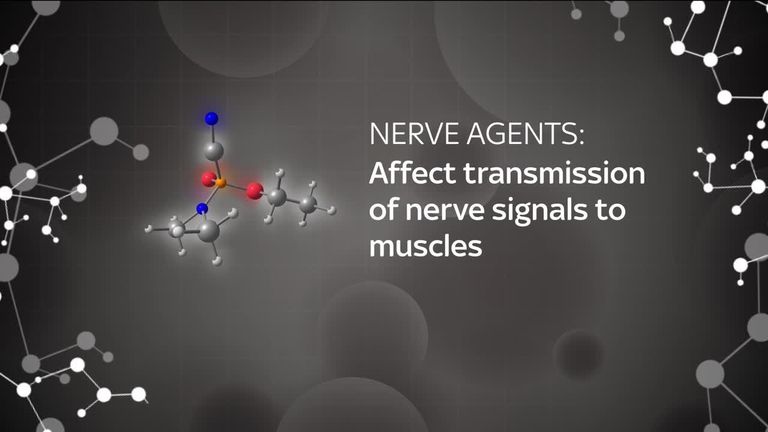Russian spy poisoning was a 'professional hit', experts say
Experts say the technical sophistication involved means it is "really likely" the nerve agent came from a state laboratory.
Thursday 8 March 2018 21:19, UK
The nerve gas used in the poisoning of ex-Russian spy Sergei Skripal and his daughter Yulia are likely to have been supplied by a state, researchers say.
The attack is being treated as attempted murder, but it is unclear what type of nerve gas was used or who used it.
Sky News has spoken to two experts who believe this was a professional hit.
"These are compounds which are so poisonous, that the only places that they're really likely to come from are state laboratories," said Andrea Sella a chemical weapons expert from University College London.
"You need a level of technical sophistication which is really high to do this.
"It's interesting that when Amber Rudd speaks of this attack, she talks about it being brazen - there's no question - but I don't think this was in any way reckless.
"This is highly targeted, and it really shows the level of impunity needed to deliver a ferocious message to particular individuals, saying we can get you anywhere we want at any time.
"And the choice of nerve agent really narrows it down to state actors."
Andy Oppenheimer, a counter-terrorism expert, told Sky News all possible compounds "are part of a type of chemical agent made specifically for warfare".
He explained: "These specific nerve agents are highly toxic and one needs to have expertise to make them.
"You need a proper military lab, you need maximum protection and whoever has inflicted this terrible attack on these individuals would have to be protected themselves.
"If it's by spray or if it was directly on the skin or to be inhaled, it has got to be done very quickly so they can get away.
"So yes - they were probably highly trained, unlike what we believe to be amateur assailants responsible for the attack in the Malaysia airport with VX.
"This looks like a professional hit."
However, there is an argument to be made against the state-sponsored theory.
Alexander Vissiliev, Russian espionage historian and journalist, believes "every possibility should be investigated properly".
He told Sky News: "From a professional point of view from an ex-KGB officer, I would say that killing someone in espionage in most cases doesn't make any sense.
"It usually brings a lot of unpredictable consequences like it was in the Litvinenko case, and usually the damage has already been done by that person so it doesn't make any sense to kill him.
"It looks to me like a mafia thing. I would investigate Sergei's business dealings after he moved to Britain.
"In the 1990s, Russian businessmen used to kill each other, but then they moved to Europe, including Britain. They changed location but their practices didn't change.
"Another possibility is that Putin was framed by his political opponents."
There is also a question of identifying the type of nerve gas used in the attack.
There are many different types of nerve agent.


![鈥疨ic: CPS
Images of two defendants in fake ID seized from Bulgarian gang found guilty of spying for Russia in a huge espionage operation from a guesthouse in Great Yarmouth. Left is Katrin Ivanova, [DOB: 01/07/1991], is of Harrow, north-west London. Right is Tihomir Ivanchev, [DOB: 31/07/1985], is of Acton, west London](https://e3.365dm.com/25/03/192x108/AG百家乐在线官网news-katrin-ivanova-tihomir-ivanchev_6849259.png?20250307175120)





